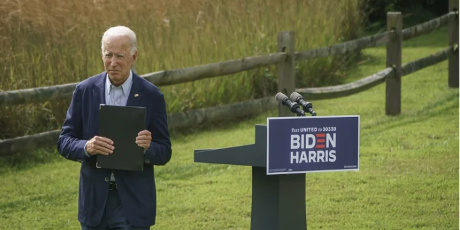Will Joe Biden's presidency be a climate game-changer? 16 Nov 2020

Analysis: the incoming US president has pledged that climate action will be a priority for his administration so what can we expect? Dr. Paul Deane, Senior Research Fellow, Energy Policy and Modelling Group, MaREI Centre/ERI
Climate action was a key message in US president elect Joe Biden's campaign and he has pledged to re-join the Paris Climate Agreement on day one of taking office. Ironically, it was just last week that the United States formally left the Paris Climate Accord, which aims to reduce greenhouse gas emissions and limit global temperature increase, almost four years after Donald Trump took office and pledged to leave the accord.
Trump didn't believe in climate change and dismissed it as a 'hoax’. But science is an evidence-based rather than belief-based system and that evidence has compelled many of America's top companies such as Ford, Microsoft and others to set ambitious emissions reduction targets and take action.
From BBC News, how President-elect Biden has made the fight against climate change one of his top priorities
The contours of the energy landscape have also changed significantly in the four years since Trump entered the White House. The cost of producing electricity from renewable resources has continued to come down; electric cars are fashionable and there is a growing number of young, informed climate activists who are mobile and vocal. Clean energy not only makes environmental sense; it also makes economic sense, but it won't all be plain sailing for Biden in his bid to set America on course for a climate neutral economy.
Biden has likened the opportunity for climate action to the Apollo lunar programs of the President Kennedy era. However, Kennedy didn’t have to convince people that the moon was real, and many Americans' views on climate change remain divided along party and ideological lines.
Compounding this, echoes of the Trump mantra that the Paris Agreement would lead to huge job losses and that climate action and employment were mutually exclusive still resonate strongly in many communities. Whatever about saving the planet, people don't want to lose their jobs and Biden has correctly focussed on employment and economic opportunity in his messaging on climate action.
From RTÉ Radio 1's Drivetime in 2015, Philip Boucher Hayes reports on what the Paris Agreement on Climate Change actually will involve
He has promised to make a $2 trillion investment in clean energy, with a plan to deploy those resources over his first term. Here again he has evidence on his side. Analysis by the International Energy Agency and the International Monetary Fund in their post- Covid Sustainable Recovery Plan demonstrated that targeted investment in clean energy and enabling policies will boost economic growth, create jobs and deliver a more resilient and cleaner energy system.
Last week, American economist Jeffrey Sachs and industry and academic partners published a detailed plan that demonstrates that Biden's vision of a climate neutral transition is possible, feasible and affordable. The overall incremental costs of the transition was calculated at just 0.4% GDP in 2050, a small fraction of America’s annual energy spending.
However, Biden will have to carefully temper expectations from grassroots environmental movements promoting the ideology of a completely fossil free future. Analysis shows that some level of fossil fuel extraction is needed and the political reality that most of this takes place in so called 'Red States' where he did not win a majority. The oil and gas industry employed just under half a million people in 2019, with jobs concentrated in regions whose economies are significantly impacted when there is a downturn in the industry.
From RTÉ Radio 1's Drivetime, Carole Colemean hears from communities in the United States who've been affected by fracking
The Shale Revolution, which uses technology to drill deep into rocks and fracture them to release trapped oil and gas (also known as hydraulic fracturing or fracking), has made America one of the top producers of oil and gas in the world. While seen as an economic miracle in many areas that were previously financially marginalised, this has come at an environmental cost.
Local pollution impacts human health and air quality. Poor practice and relaxed enforcement has contributed to excessive leaking of natural gas, a remarkably potent greenhouse gas in its raw uncombusted state, into the atmosphere (these leaks can be seen from space). This must be stopped if the US shale industry is to remain relevant within a wider global oil and gas industry that has targets for carbon neutrality from many of its main companies.
Biden has stated he will introduce or reinstate new standards (many of which were rolled back or relaxed during the Trump presidency) on oil and gas operations to eliminate these leaks. The international energy agency estimate that 15% of these emissions can be eliminated at no costs but going beyond this will require strong political follow through to clean up and re-orientate an industry that will be required for years to come.
Trump's regressive views on climate action would have placed America on the wrong side of history, but Biden will have to work hard to show people that what is good for the planet is good for business. Producing clean energy is not just about the environment; it also about the economy.